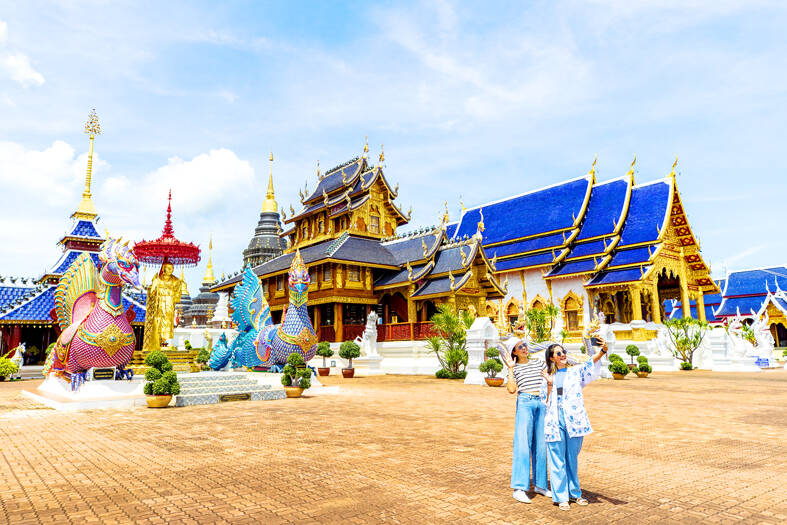The Thai government on Friday announced that Taiwanese would be allowed to stay in the country for up to 60 days per entry, under the Southeast Asian country’s visa-free program starting from today.
Taiwan is among 93 countries included in the Thai visa-waiver program, which has been expanded from 57 countries, with the visa-exempt entry extended from 30 to 60 days.
After taking office last year, Thai Prime Minister Srettha Thavisin has vowed to grant more visa waivers to foreign travelers as part of efforts to stimulate tourism.

Photo Courtesy of Tourism Authority of Thailand
The expanded visa-waiver program was on Friday signed by Thai Minister of the Interior Anutin Charnvirakul, although the government had previously said the measures would take effect last month.
Thailand first announced a visa waiver for Taiwanese travelers on Nov. 10 last year, which it continued for six months.
In early May, the Thai government announced that it would extend that visa waiver for Taiwanese tourist for an additional six months from May 11 to Nov. 11 and that the maximum stay would be 30 days.
Before joining the visa waiver program, Taiwanese were required to pay NT$1,200 per person for a Thai visa.
Thailand is one of the most popular destinations for Taiwanese tourists.
In the first four months of this year, 210,283 Taiwanese visited the country, up 74.05 percent from a year earlier, data compiled by the Tourism Administration showed.
The Ministry of Foreign Affairs said it welcomed the Thai government’s inclusion of Taiwan in the expanded visa-free program, adding that the new measure means the visa-free status granted to Taiwanese would continue without the need for an extension.
Making foreign travel more convenient for Taiwanese is one of the most important tasks for the ministry, it said, adding that the inclusion of Taiwan in the Thailand’s expanded visa-free program demonstrates its long-term efforts to improve bilateral ties.
Thailand is part of the nation’s New Southbound Policy and has become a close partner in a wide range of areas such as trade, economics, investments, education and agriculture development, the ministry said.
With the new visa-free program, Taipei and Bangkok are expected to continue to boost bilateral exchanges, it said.
The New Southbound Policy, launched in 2016 by then-president Tsai Ing-wen (蔡英文), aims to enhance trade and exchanges between Taiwan and 18 countries in Southeast and South Asia, as well as Australia and New Zealand, to reduce Taiwan’s dependence on China.
Meanwhile, Indonesia is to launch a new visa-waiver program for tourists from 20 countries, including Taiwan, Indonesian Minister of Tourism and Creative Economy Sandiaga Salahuddin Uno said last week.
The policy could be implemented in October, he said.

FALSE DOCUMENTS? Actor William Liao said he was ‘voluntarily cooperating’ with police after a suspect was accused of helping to produce false medical certificates Police yesterday questioned at least six entertainers amid allegations of evasion of compulsory military service, with Lee Chuan (李銓), a member of boy band Choc7 (超克7), and actor Daniel Chen (陳大天) among those summoned. The New Taipei City District Prosecutors’ Office in January launched an investigation into a group that was allegedly helping men dodge compulsory military service using falsified medical documents. Actor Darren Wang (王大陸) has been accused of being one of the group’s clients. As the investigation expanded, investigators at New Taipei City’s Yonghe Precinct said that other entertainers commissioned the group to obtain false documents. The main suspect, a man surnamed

DEMOGRAPHICS: Robotics is the most promising answer to looming labor woes, the long-term care system and national contingency response, an official said Taiwan is to launch a five-year plan to boost the robotics industry in a bid to address labor shortages stemming from a declining and aging population, the Executive Yuan said yesterday. The government approved the initiative, dubbed the Smart Robotics Industry Promotion Plan, via executive order, senior officials told a post-Cabinet meeting news conference in Taipei. Taiwan’s population decline would strain the economy and the nation’s ability to care for vulnerable and elderly people, said Peter Hong (洪樂文), who heads the National Science and Technology Council’s (NSTC) Department of Engineering and Technologies. Projections show that the proportion of Taiwanese 65 or older would

The government is considering polices to increase rental subsidies for people living in social housing who get married and have children, Premier Cho Jung-tai (卓榮泰) said yesterday. During an interview with the Plain Law Movement (法律白話文) podcast, Cho said that housing prices cannot be brought down overnight without affecting banks and mortgages. Therefore, the government is focusing on providing more aid for young people by taking 3 to 5 percent of urban renewal projects and zone expropriations and using that land for social housing, he said. Single people living in social housing who get married and become parents could obtain 50 percent more

Democracies must remain united in the face of a shifting geopolitical landscape, former president Tsai Ing-wen (蔡英文) told the Copenhagen Democracy Summit on Tuesday, while emphasizing the importance of Taiwan’s security to the world. “Taiwan’s security is essential to regional stability and to defending democratic values amid mounting authoritarianism,” Tsai said at the annual forum in the Danish capital. Noting a “new geopolitical landscape” in which global trade and security face “uncertainty and unpredictability,” Tsai said that democracies must remain united and be more committed to building up resilience together in the face of challenges. Resilience “allows us to absorb shocks, adapt under